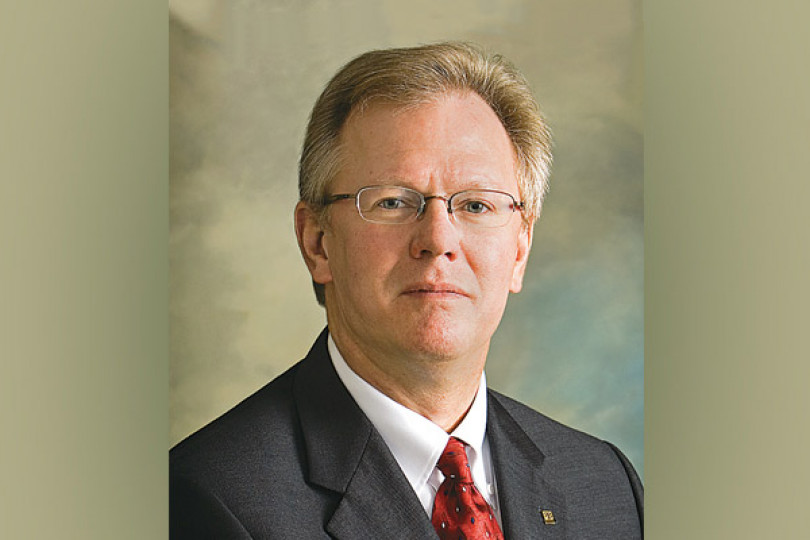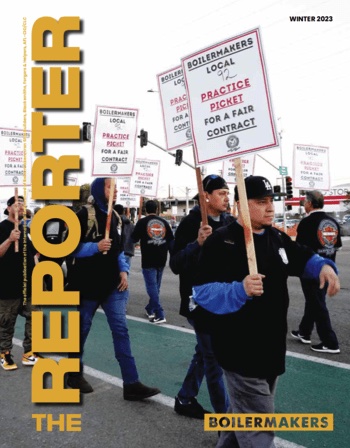Party candidates vie for extremist mantle
THE GOP PRESIDENTIAL debates have illustrated just how far right the Republican Party has shifted — and the struggle that awaits organized labor should one of their candidates succeed in unseating President Obama in November.
As the candidates make their case for the Republican Party’s nomination, they strain to wear the mantle of “most conservative” and most “antiunion.” During this process, we have witnessed vicious attacks among the contenders. Any perception that a candidate has acted outside a strict, extreme-right orthodoxy has been met with condemnation and ridicule.
It is strange indeed that any of the remaining Republican candidates might not be conservative enough for the Grand Old Party. Mitt Romney made his fortune by stripping troubled companies of their assets and cutting jobs, leaving workers without the pensions and health care insurance promised to them. Rick Santorum’s social conservatism threatens the rights of women on abortion and gays who seek equal rights. Newt Gingrich has often boasted about his “90 percent Conservative Union voting record” and the fact that he campaigned for Ronald Reagan and Jack Kemp. And Ron Paul has said he would all but eliminate the federal government and programs designed to help the most vulnerable among us.
Every remaining Republican candidate has set his sights on dismantling labor unions.
It is clear that every remaining Republican candidate for the party’s nomination has set his sights on dismantling labor unions, reducing the social safety net, and neutering government.
American voters have to ask themselves: Are these really the priorities we want our next president to hold? Do we want a leader who is dedicated to cutting Medicare, Social Security, and unemployment benefits while protecting the assets of the wealthy? Do we want a leader of the free world who is committed to destroying unions and repressing worker rights?
Party members express doubts about GOP candidates
THERE APPEARS TO be unease among Independents and moderate Republicans about how extreme the Republican agenda has become.
But those who back the GOP's agenda don’t seem comfortable with the leading candidates, either. Front-runners Romney and Santorum have received rather lackluster support. There has even been talk within the party of a brokered convention in August if none of the candidates can clinch the nomination before then. That would make it possible for a candidate who is not even running for the nomination at this time to enter the fray.
It is alarming that two of the names mentioned as favorites for a brokered convention are union-busting politicians Chris Christie, New Jersey’s governor, and Mitch Daniels, governor of Indiana.
On Feb. 1 of this year, Daniels signed right-to-work legislation making Indiana the 23rd state to adopt this oppressive law and the first state to do so in a decade. Three weeks later, on Feb. 21, Christie signed a law denying public workers the right to negotiate over benefits for four years and forcing them to pay more for the benefits they have been promised. In announcing the move, Christie referred to his state as “a model for America.”
It is a model alright — a model for the continued decline of the middle class and broken contracts once made in good faith.
To consider replacing extremist, antiunion candidates with other extremist, antiunion candidates reveals much about the rigid and dangerous thinking of the Republican election machine.
Candidates support national right-to-work law
ROMNEY, SANTORUM, AND Paul have all declared an open season on unions by taking a public pledge to push for a national right-to-work law. We all know what that means. Right-to-work undermines unions by allowing workers to opt out of joining the union or paying dues or fees, leaving their fellow workers who are union members to fund the union. By law, the union still must represent these free riders. Right-to-work thus creates friction between dues-paying members and free riders, and it diminishes the union’s financial strength, which is essential to provide services. Unscrupulous employers can take advantage of any weakness in solidarity at the bargaining table.
Gingrich has said right-to-work should be left to the states (but he supports defunding the National Labor Relations Board, which would be even more debilitating to unions).
It is sickening to see the conservative presidential hopefuls squirm as extreme right power brokers push them even farther right. Santorum reportedly gave his pledge to support a national RTW law only after the National Right-to-Work Committee twisted his arm.
Romney flip-flopped on the public praise he gave unions years ago, when he chaired the Salt Lake City Olympic Committee and needed labor's help to fast-track highway improvements in advance of the games. He even signed a project labor agreement back then. Today Romney has no use for unions. Addressing a conference of the antiunion Associated Building Contractors held in Arizona recently, he stated:
“One of the first things I will do, actually on day one, is I will end the government’s favoritism towards unions and contracting on federal projects. I will fight to repeal Davis-Bacon... and I will fight for right-to-work laws.”
Whether Romney’s past praise of unions was legitimate or just window dressing, one thing seems clear: he is now serving a far-right base, and that base will hold him to his promises.
Not “your father’s GOP”
HISTORICALLY, UNIONS have been at odds with the Republican Party because their interest is in supporting big business rather than workers. Occasionally, we have been able to work with GOP politicians on issues where our interests have coincided.
Eisenhower’s sentiments would be considered heresy by today’s radical right Republican Party.
But the far-right element in the party has so poisoned the well, that even occasional collaboration on specific issues appears doubtful. No matter who becomes the Republican presidential nominee, it is clear that the candidate will be expected to go to war against organized labor. The Chamber of Commerce will demand it. The Associated Building Contractors will demand it. And the National Right-to-Work Committee will demand it.
Republican President Dwight D. Eisenhower once said: “Workers have a right to organize into unions and to bargain collectively with their employers. And a strong, free labor movement is an invigorating and necessary part of our industrial society.”
Eisenhower’s sentiments would be considered heresy by today’s radical right Republican Party.







